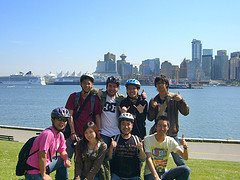Houseboat holiday
10 Feb 2007
SULAIMAN JAAFAR
-------------------------------------------------------------
The river gently laps the houseboat and the slow rhythmic rocking can almost put you to sleep. Welcome to an charming floating holiday by the banks of Sungai Kelantan in downtown Kota Baru. SULAIMAN JAAFAR writes.
YOU can get down to do some leisurely reading as you immerse yourself in the rich, old world ambience of Malay wood carvings.
Or you can cast a lazy line and hope for a bite as the houseboat gently rocks.
Despite the unassuming name, the Floating Homestay has been attracting thousands of visitors, both local and foreign, since it opened for business in 2000.
Unlike others found in Kashmir or in the country, the Floating Homestay has been described by guests as a floating palace and one of Kelantan's best kept secrets.
Built like a traditional Kelantanese Malay house, it has an attap roof and sports bamboo wall panels.
The verandahs are adorned with exquisite dark wood carvings while the rooms are filled with prized antique furniture.
Floating Homestay owner Nik Ismail Salleh, 52, said his houseboat was previously a floating hostel for backpackers.
"My family decided to upgrade the place and we wanted to build something that would be remembered by visitors.
"So we decided to build it up as a sort of stay-in museum that would showcase our Kelantanese Malay culture."
The houseboat covers about 2,800 sq metres and has four bedrooms with bathrooms attached, a living room and a kitchen.
Rooms cost an average of RM200 a night.
Unlike other homestay establishments, Floating Homestay serves no food or drinks. Guests can make use of the kitchen to prepare their own meals and drinks or buy them outside and dine at the boathouse.
The houseboat was built by five local workmen and completed in about four months at a cost of RM200,000.
"They first constructed the floor and frame.
"The bamboo panels, specially ordered from Kampung Talak, Tumpat, were then installed, followed by the rembia roof," Nik Ismail explained.
Nik Ismail said unlike traditional houseboats, his homestay uses plastic containers as pontoons instead of bamboo.
"Using plastic is cheaper as bamboo is expensive and has to be changed every four years," he said.
Nik Ismail, who does not receive walk-in guests, said most of his local guests are regulars, and recommended by friends and other clients.
Foreign guests are referred by Kuala Lumpur-based tour agency Peterson Travel Service.
His reason for being selective about his guests?
"Although we have a caretaker, the guests are on their own most of the time and we want to ensure that all our clients are able to relax comfortably without being disturbed by rowdy guests."
Responsible guests, said Nik Ismail, will also take care of the houseboat and the antiques which are prized family heirlooms.
Nik Ismail expects to receive more foreign guests next year as the Floating Homestay has been listed in the latest edition of Rough Guide, an international traveller's guide.
Nik Ismail, who has a pallet-making factory in Peringat, near Kota Baru, said the family did not take up the venture merely for profit.
"I am happy if we can break even," he said.
"Our aim is to showcase the local culture to visitors, especially those from abroad.
"And we are also able to provide part-time jobs for local residents."
Among the foreign guests who have been on the houseboat are Japanese, Americans, Scandinavians and Australians.
In anticipation of better response to his homestay programme, Nik Ismail is planning to build five more houseboats, including a double-storey one and a restaurant in the same area.
"The problem is convincing the authorities in giving approval. But we are confident it can become a major tourist attraction in the state."

+New+Front+Cover+3x3in.jpg)



No comments:
Post a Comment